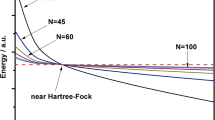Abstract
The solutions of the time-independent Schrödinger equation provide a quantum description of the stationary state of electrons in atoms and molecules. The Hartree–Fock problem consists in expressing these solutions by means of finite dimensional approximations thereof. These are themselves linear combinations of an existing linearly independent set; best approximations are obtained when a certain energy function is minimized. In Lavor et al. (Europhys Lett 5(77):50006p1–50006p5, 2007) we proposed a new mathematical programming (MP) approach which enhanced the likelihood of attaining globally optimal approximations, limited to closed-shell atomic systems. In this paper, we discuss an extension to open-shell systems: this is nontrivial as it requires the expression of a rank constraint within an MP formulation. We achieve this by explicitly modelling eigenvalues and requiring them to be nonzero. Although our approach might not necessarily scale well, we show it works on two open-shell systems (lithium and boron).
Similar content being viewed by others
References
Belotti, P., Lee, J., Liberti, L., Margot, F., Wächter, A.: Branching and bounds tightening techniques for non-convex MINLP. Optim. Methods Softw. 24(4), 597–634 (2009)
Blumenthal, L.: Theory and Applications of Distance Geometry. Oxford University Press, Oxford (1953)
Cardozo, T., Chaer Nascimento, M.: Private communication (2012)
COIN-OR: Introduction to IPOPT: A tutorial for downloading, installing, and using IPOPT (2006)
Fletcher, R., Leyffer, S.: User manual for FILTER. Technical Report, University of Dundee, London (1999)
Fourer, R., Gay, D.: The AMPL Book. Duxbury Press, Pacific Grove (2002)
Gill, P.: User’s Guide for SNOPT 5.3. Systems Optimization Laboratory. Department of EESOR, Stanford University, California (1999)
Hollauer, E., Nascimento, M.: A generalized multistructural wave function. J. Chem. Phys. 99, 1207 (1993)
Janes, P.: Rigorous numerical approaches in electronic structure theory. Ph.D. Thesis, Australian National University (2011)
Janes, P., Rendell, A.: Deterministic global optimization in ab-initio quantum chemistry. J. Glob. Optim. 56(2), 537–558 (2013)
Lavor, C., Cardozo, T., Nascimento, M.A.C.: Using an interval branch-and-bound algorithm in the Hartree–Fock method. Int. J. Quantum Chem. 103, 500–504 (2005)
Lavor, C., Liberti, L., Maculan, N., Chaer Nascimento, M.: Solving Hartree–Fock systems with global optimization methods. Europhys. Lett. 5(77), 50006p1–50006p5 (2007)
Levine, I.: Quantum Chemistry, 2nd edn. Prentice-Hall, Upper Saddle River (2000)
Liberti, L.: Reformulations in mathematical programming: definitions and systematics. RAIRO-RO 43(1), 55–86 (2009)
Liberti, L.: Modelling rank constraints in mathematical programming. In: Pickl, S., et al. (eds.) Proceedings of the 11th Cologne-Twente Workshop on Graphs and Combinatorial Optimization. Universität der Bundeswehr, München (2012)
Liberti, L.: Reformulations in mathematical programming: automatic symmetry detection and exploitation. Math. Program. A 131, 273–304 (2012)
Liberti, L.: Symmetry in mathematical programming. In: Lee, J., Leyffer, S. (eds.) Mixed Integer Nonlinear Programming, IMA, vol. 154, pp. 263–286. Springer, New York (2012)
Liberti, L., Lavor, C., Nascimento, M.C., Maculan, N.: Reformulation in mathematical programming: an application to quantum chemistry. Discrete Appl. Math. 157, 1309–1318 (2009)
Martin, R.: Electronic Structure: Basic Theory and Practical Methods. Cambridge University Press, Cambridge (2004)
Murray, W., Gill, P., Raman, R., Kalvelagen, E.: GAMS/MINOS: a solver for large-scale nonlinear optimization problems. Technical Report 10.1.1.16.8658, CiteSeerX (2007)
Penrose, R.: The Road to Reality. Knopf, New York (2004)
Rendl, F.: Semidefinite relaxations for partitioning, assignment and ordering problems. 4OR 10(4), 321–346 (2012)
Schoen, F.: Two-phase methods for global optimization. In: Pardalos, P., Romeijn, H. (eds.) Handbook of Global Optimization, vol. 2, pp. 151–177. Kluwer, Dordrecht (2002)
Schrödinger, E.: Quantisierung als Eigenwertproblem. Ann. Phys. 384, 361–377 (1926)
Solis, F., Wets, R.: Minimization of random search techniques. Math. Oper. Res. 6(1), 19–30 (1981)
Spellucci, P.: DONLP2 Users Guide. TU Darmstadt, Darmstadt (2009)
Szabo, A., Ostlund, N.: Modern Quantum Chemistry. McGraw-Hill, New York (1989)
Zorn, K., Sahinidis, N.: Hartree fock self-consistent calculations: global optimization of electronic structure. In: Proceedings of 10th AIChE Annual Meeting. AIChE (2010)
Acknowledgements
The authors are thankful to Brazilian research agencies FAPERJ, FAPESP, CAPES and CNPq for financial support, and to M.A. Chaer Nascimento and T.M. Cardozo for useful discussions leading to the formulation of Eq. (4). The first author (LL) has received funding from the European Union’s Horizon 2020 research and innovation programme under the Marie Sklodowska-Curie Grant Agreement No. 764759 “MINOA”.
Author information
Authors and Affiliations
Corresponding author
Additional information
Publisher's Note
Springer Nature remains neutral with regard to jurisdictional claims in published maps and institutional affiliations.
Rights and permissions
About this article
Cite this article
Liberti, L., Lavor, C. & Maculan, N. A mathematical programming formulation for the Hartree–Fock problem on open-shell systems. Optim Lett 13, 429–437 (2019). https://doi.org/10.1007/s11590-019-01386-0
Received:
Accepted:
Published:
Issue Date:
DOI: https://doi.org/10.1007/s11590-019-01386-0




